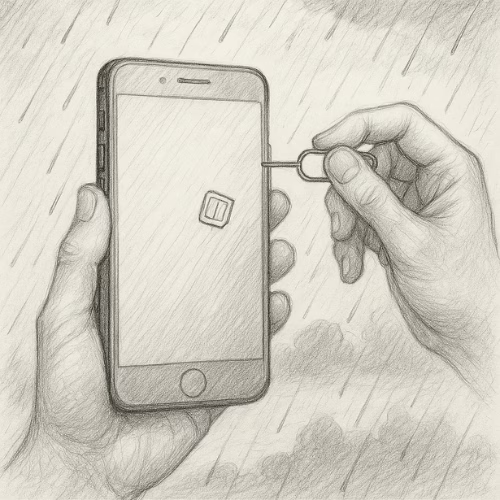The alarm went off at 4 a.m.
Outside, midsummer rain whispered against the window.
It was cool, dark, and too early for any dreams.
I repacked my bag one last time, lightening the load.
In doing so, I accidentally left behind one thing I would sorely need:
the tiny SIM card opener. A trivial object—until it’s not.
The train was nearly empty. I sat alone, quiet.
Then a tram. Then the walk to the ferry port.
Numbness, not excitement.
This wasn’t a vacation. It wasn’t even an escape.
It was just movement—forward, away, within.
I had booked a place called Imaginary Hostel in Tallinn, tucked inside the Old Town.
No need to walk miles like I used to from expensive hotels.
Now I returned to the kind of life I loved most—
a student life. Poor, yes. But free.
Of course, karma had its own schedule.
My SIM had no roaming.
I needed a prepaid one.
But without the opener, it felt like being locked out of my own phone.
The first kiosk refused to help.
The second—a young woman looked at me, understood.
She didn’t talk much.
Just bent a paperclip.
The first one was too big.
The second was perfect.
And just like that, my phone breathed again.
One of those lessons: always carry a paperclip.
Like they say with plasters—though I never use those.
Still, it made me smile.
On the ferry, I sat quietly.
Too tired to think, but I tried to read a book I had failed to finish for four years:
Make Your Brain Work by Amy Brann.
The irony wasn’t lost on me.
I read a few pages, then fell asleep.
Sometimes that’s the only thing your brain needs—
not effort, not wisdom.
Just stillness.
When I arrived in Tallinn, I tried Bolt like everyone does.
The first ride failed.
The second came an hour later and cost a third of the original price.
Supply, demand, the economy of human desperation.
Even algorithms profit off arrivals.
The hostel was hidden between a bike shop and a restaurant,
barely a sign.
Old building, narrow stairs,
and a check-in policy that waited for the exact hour, not a minute before.
My phone was dying.
The receptionist pointed to a dusty coworking room—broken leather chairs,
but warm enough to be human.
Tea. Milk. Bread.
A shelf of jam jars and a working kettle.
A kitchen for cooking, though I’ve always preferred cafés.
Still, this felt like a luxury in its own right.
Clean sheets. A bed.
A locker.
A space.
No pretension. Just people.
All kinds of accents, clothes as casual as the mood.
This wasn’t where I’d take my family or friends.
But when I’m alone,
this is exactly where I end up.
Not because I’m poor.
But because I’m free.



